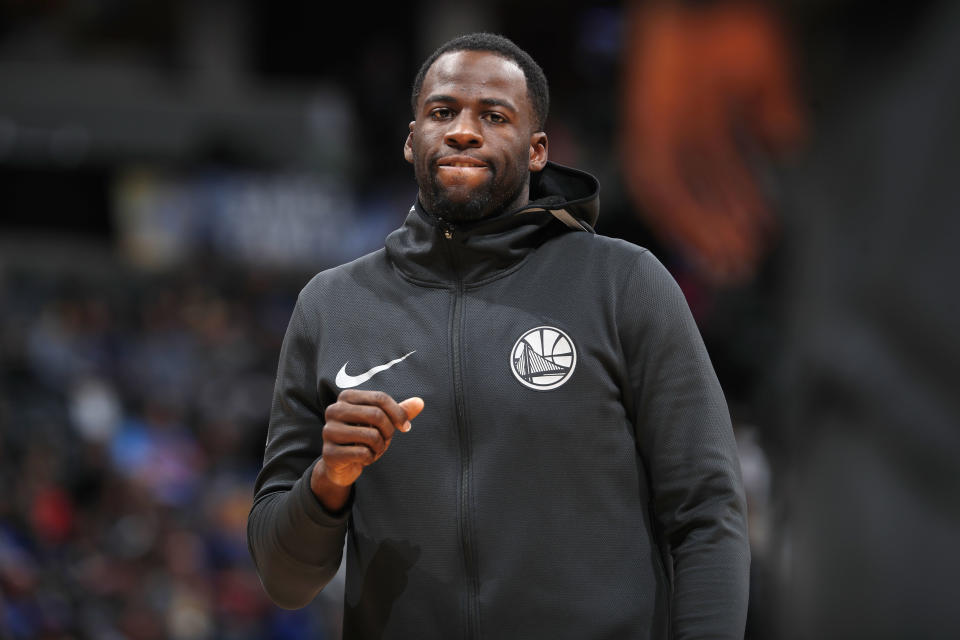NBA star Draymond Green on his business approach: 'Follow the CEOs'
Blink Fitness, the low-cost gym chain owned by Equinox, announced this week its biggest franchising deal ever, and its first foray into the Midwest: Golden State Warriors forward Draymond Green and his business partner are buying 20 Blink locations, planned for Michigan and Illinois.
Green says the deal came about from his friendship with Equinox executive chairman Harvey Spevak. The gyms looked like a good investment, but Green, a Michigan native who played basketball at Michigan State University, also relished the fact that, “There was an opportunity to take it to Michigan… You’ve got more and more people moving back to downtown Detroit, it’s starting to get that big-city feel back, and everything else needs to follow. So, to put a gym down there to help get everyone’s day started, I think, is amazing. To help the community and eventually bring jobs back to the state of Michigan, hopefully going back to my hometown of Saginaw, was a great opportunity that I couldn’t pass up.”
Blink is rapidly expanding since it launched in 2013, with the stated goal of having 300 locations open in five years, split between franchise and company-owned. It currently has 90 locations open or soon to open.
Blink’s image is all about being high-quality despite its low costs—any risk of sacrificing consistency as it starts franchising? Blink president Todd Magazine says no: “We have one organization working across company-owned and franchising in order to ensure that we have consistency.”

Add Blink Fitness to Draymond Green’s other investments, which include nutritional supplement Performance Inspired and boxing fitness boutique Rumble, and a theme emerges.
Green has focused on fitness-related investments at a time when many of his Warriors teammates are making names for themselves as tech investors. (The Warriors are, after all, Silicon Valley’s sports team.) Stephen Curry and Andre Iguodala, to name two examples, have earned attention for their ventures as tech angel investors.
Green is interested in tech as well—and he’s a partner in LeBron James’s media platform Uninterrupted—but says he started with fitness because, “I understand those things.”
Tech investing is something he doesn’t want to jump into until he learns more about it—a sentiment you don’t always hear pro athletes express. “I wanted to learn the field more and more before I just start throwing money,” he says. “It’s something that I’ve been studying for years, and that I continue to study. I’ll probably start making investments here and there, but I wanted to focus on things that I understood more, and get an understanding of those that I didn’t.”
Green’s measured approach to investing his wealth off the court comes from a select group of mentors. He specifically names Equinox CEO Spevak, Miami Dolphins owner and Related Companies majority owner Stephen Ross, Mandalay Entertainment CEO Peter Guber, and Chamath Palihapitiya, venture capitalist and part owner of the Warriors, as business influences.
“One thing I’ve learned is, follow the CEOs and people that have proven track records,” he says. “Just talk to a lot of those guys about things that they’re doing, and continue to try to learn more and more.” Green says his caution in tech investing comes from Palihapitiya in particular. “We all tend to think, ‘If I invest in tech, this app is going to blow up this year and I’m going to be crazy rich!’ And it doesn’t work like that,” he says.
But it isn’t only CEOs that have influenced Green’s business approach. He’s learned from fellow athletes, too, including the Warriors’ rival in the Eastern Conference: LeBron James.
“He’s done an amazing job and actually opened up a lot of doors for a lot of us athletes in the route that we’re taking now,” Green says, “in being more involved as partners, as opposed to endorsees.”
Indeed, the model for athletes investing in startups has shifted: In the past, a company would pay an athlete a fee and the athlete would appear in advertisements as a spokesperson. Now the more common model is an equity partnership, where an athlete gets a stake in a small business and also advises on strategy.
Green’s deal with Blink isn’t an endorsement; he won’t appear in ads for Blink or in any marketing. He’s just one franchisee—albeit its most famous one, by far.
—
Daniel Roberts is the sports business writer at Yahoo Finance. Follow him on Twitter at @readDanwrite. Sportsbook is our sports business video series and podcast.
Read more:
Rob Gronkowski on the pros and cons of fantasy football
David Ortiz: ‘It’s so easy to blow money’
MLS star Jozy Altidore on the pros and cons of social media for athletes
Mariano Rivera’s advice for athletes: ‘That money will never come back’
How NFL star Luke Kuechly is growing his business off the field
NFL linebacker Josh Martin spent his offseason working in venture capital
